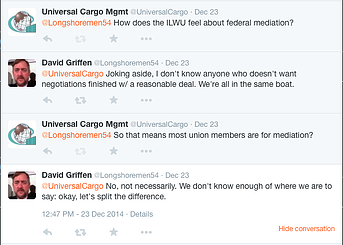So the PMA did what shippers and retailers have been calling for since nearly the beginning of negotiations: the PMA requested federal mediation.
Now a week has passed since the PMA asked for mediation, but the ILWU has not agreed to it.
 I asked ILWU’s Local 54 PAC Chairman David Griffen, who graciously gave Universal Cargo an interview a little while back, how the union felt about federal mediation.
I asked ILWU’s Local 54 PAC Chairman David Griffen, who graciously gave Universal Cargo an interview a little while back, how the union felt about federal mediation.
Mr. Griffen said, “I don’t know anyone who doesn’t want negotiations finished with a reasonable deal. We’re all in the same boat.”
While there is room for optimism in that answer, it didn’t exactly answer the question. I responded, “So that means most union members are for mediation?”
“No, not necessarily,” Mr Griffen said. “We don’t know enough of where we are to say: okay, let’s split the difference.”
Now this is a twitter conversation, so maybe the limited number of characters is causing a misunderstanding; however, 7 months seems like a long time for the ILWU not to know where they are in negotiations.
The time has come for a federal mediator to join the table and help the ILWU and PMA to finally come together on a contract.
Come on, ILWU, let an impartial third party help in the negotiations. They won’t just sit down and say, “Okay, let’s split the difference.”
Here is the second press release from the PMA requesting federal mediation:
PMA Renews Call for Federal Mediation in West Coast Longshore Negotiations
SAN FRANCISCO, CA (Dec. 29, 2014) – The Pacific Maritime Association (PMA), which represents employers at America’s 29 West Coast ports, today released the following statement regarding its ongoing contract negotiations with the International Longshore & Warehouse Union (ILWU):
“The ILWU’s press release today underscores the need for federal mediation in these negotiations. Unfortunately, the characterization that the PMA and ILWU have only a ‘few issues’ left to resolve is inaccurate. Significant issues remain unresolved, including wages, pensions, jurisdiction and work rules. Further, the ILWU’s escalating rhetoric on congestion is nothing more than a smokescreen for its slowdown activities.
“The only major coast-wide issue on which we’ve reached tentative agreement is the health care plan – already one of the most generous in America. Even with the tentative health care agreement – identified by the ILWU as its #1 priority when negotiations began in May – the Union has engaged in debilitating work slowdowns over the past two months at terminals up and down the coast.
“The Union’s decision, for example, to limit the number of yard crane operators in Southern California has exacerbated congestion issues in Los Angeles and Long Beach. In the Pacific Northwest, the ILWU slowdowns – which have reduced productivity by as much as 60% –created a meltdown that has backed up cargo for weeks. Now the ILWU has stepped up slowdown activity at the Port of Oakland, reducing productivity to 50% of normal. As a result of ILWU slowdowns, crops are rotting, products aren’t getting to customers, contracts are being canceled, local employees are getting furloughed and businesses are diverting future shipments away from the West Coast.
“Had the Union agreed to extend the now-expired contract, we could have let an arbitrator rule on the slowdowns. But not having a contract extension is like playing a football game without a referee. All the while, the West Coast ports are losing their competitive edge in an environment that will only become more challenging with the opening of the expanded Panama Canal next year.
“PMA’s leadership is acutely aware of and concerned about the ramifications of ILWU work actions on the West Coast’s competitive standing. Our Board and Coast Committee members, who represent carriers and terminal operators, have been intimately involved in these negotiations – starting in the months leading up to the contract talks and in the seven months since talks began.
“The PMA leadership team has offered a ‘no-takeaways’ proposal that includes wage and pension increases on top of the ILWU’s robust compensation package. The average full-time ILWU worker currently earns in excess of $147,000, and is eligible for a pension with a maximum annual benefit of nearly $80,000 – and current proposals would increase these even further. Additionally, PMA has offered to increase the pay guarantee program that enables registered workers to maintain full-time earnings during times of limited work opportunity.
“Given the lack of progress at the table, the ILWU’s continuation of debilitating work slowdowns and the impact those actions are having on businesses throughout America, it’s clear that mediation is required to resolve the many issues that remain at the bargaining table.”
